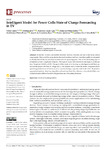Intelligent Model for Power Cells State of Charge Forecasting in EV

View/
Use this link to cite
http://hdl.handle.net/2183/31763
Except where otherwise noted, this item's license is described as Attribution 4.0 International (CC BY 4.0) https://creativecommons.org/licenses/by/4.0/
Collections
- Investigación (EPEF) [590]
Metadata
Show full item recordTitle
Intelligent Model for Power Cells State of Charge Forecasting in EVAuthor(s)
Date
2022-07-19Citation
López, V.; Jove, E.; Zayas Gato, F.; Pinto-Santos, F.; Piñón-Pazos, A.J.; Casteleiro-Roca, J.-L.; Quintian, H.; Calvo-Rolle, J.L. Intelligent Model for Power Cells State of Charge Forecasting in EV. Processes 2022, 10, 1406. https://doi.org/10.3390/pr10071406
Abstract
[Abstract] In electric vehicles and mobile electronic devices, batteries are one of the most critical components. They work by using electrochemical reactions that have been thoroughly investigated to identify their behavior and characteristics at each operating point. One of the fascinating aspects of batteries is their complicated behavior. The type of power cell reviewed in this study is a Lithium Iron Phosphate LiFePO4 (LFP). The goal of this study is to develop an intelligent model that can forecast the power cell State of Charge (SOC). The dataset used to create the model comprises all the operating points measured from an actual system during a capacity confirmation test. Regression approaches based on Deep Learning (DL), such as Long Short-Term Memory networks (LSTM), were evaluated under different model configurations and forecasting horizons.
Keywords
LSTM
Forecasting
Battery
Forecasting
Battery
Editor version
Rights
Attribution 4.0 International (CC BY 4.0) https://creativecommons.org/licenses/by/4.0/
ISSN
2227-9717






